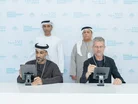Middle East’s first Senseable City Lab is launched in Dubai

Dubai Future Foundation (DFF) and the Massachusetts Institute of Technology (MIT) have signed an agreement to launch the Middle East’s first Senseable City Lab to help address the challenges faced by cities in a fast-changing world.
In a statement, DFF said that the Lab is part of a global MIT initiative that researches and tests pilot projects for planning urbanisation and the rapid growth of cities. The Senseable City Lab carries out interdisciplinary research in Singapore, Stockholm, Amsterdam, Lagos, and now Dubai, it added.
While cities occupy only 3% of the Earth's land, they consume 70% of energy sources and account for 80% of CO2 emissions. To address this urgent and unsustainable imbalance, the Lab aims to find innovative solutions to make cities more resilient and efficient, the statement continued.
The agreement was signed on the side-lines of the World Government Summit 2023 by Khalfan Belhoul, Chief Executive Officer of DFF, and Professor Carlo Ratti, Director of the Senseable City Lab at MIT. Witnessing the signing were Abdulla Al Basti, Secretary General of The Executive Council of Dubai and His Excellency Mattar Al Tayer, Commissioner-General for Infrastructure, Urban Planning and Wellbeing Pillar and Chairman of the Supreme Committee of Urban Planning in Dubai.
Al Basti applauded the partnership and highlighted its potential to develop the technological skills needed to enhance future urban planning.
He added: "The agreement with MIT emphasises Dubai's focus on transforming innovations from concepts into reality, while developing new knowledge and tools to better serve our world and keep pace with Dubai's future ambitions. The partnership’s research and development strategy focus on finding solutions to the most pressing challenges, working towards increasing productivity, developing services, enhancing economic resilience, and preparing for the future.
The partnership aims to create a scientific platform that harnesses the vision of His Highness Sheikh Mohammed bin Rashid Al Maktoum, Vice President and Prime Minister of the UAE and Ruler of Dubai, and the directives of His Highness Sheikh Hamdan bin Mohammed bin Rashid Al Maktoum, Crown Prince of Dubai and Chairman of the Executive Council, to make Dubai a testbed and laboratory for scientific innovation, he stated.
"Selecting Dubai as a headquarters for the MIT Senseable Lab enhances the city’s global role in the advancement of future cities through partnerships between government, private and academic sectors, with contributions from scientists, futurists, and innovators from the UAE and the around the world.”
Enhancing the Advancement of Future Cities
The launch was accompanied by the establishment of the Senseable City Consortium Fellowship Program, which aims to empower and guide partners to implement actionable ideas to create change. It will also provide opportunities for companies in Dubai to engage with this interdisciplinary research to inform potential future innovations.
Carlo Ratti, Director of the Senseable City Lab at MIT stated: "We are proud to collaborate with the Dubai Future Foundation to bring the Senseable City Lab to Dubai. The city's forward-thinking approach and its commitment to innovation make it the perfect location to explore some of the most pressing issues facing cities today.”
The Senseable City Lab in Dubai is expected to have a significant impact on the development of smart cities in the region and the world. The launch of the MIT Lab represents a significant step forward in addressing the challenges of the future, and a commitment to making cities more sustainable and efficient for future generations.
"The signing of this agreement marks a major step forward in Dubai's journey towards becoming a smart and sustainable city,” added Khalfan Belhoul, CEO of DFF.
“The Senseable City Lab and the Fellowship Program will play a vital role in creating knowledge and game-changing solutions for the urban environment that will benefit not only Dubai but cities around the world,” he concluded.
